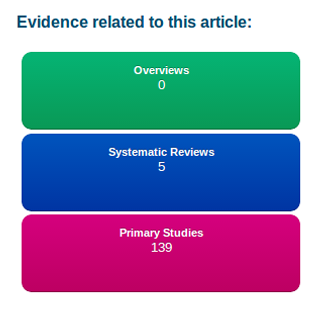PDQ (“pretty darn quick”)-Evidence facilitates rapid access to the best available evidence for decisions about health systems. It includes systematic reviews, broad syntheses of reviews (including evidence-based policy briefs), primary studies included in systematic reviews and structured summaries of that evidence.
El objetivo de PDQ-Evidence es entregar un acceso rápido a revisiones sistemáticas sobre sistemas de salud A unique feature of PDQ-Evidence is that it links together systematic reviews, broad syntheses of reviews and primary studies, thus providing a highly efficient method for searching. In addition, it includes translations of the titles and abstracts of included records to facilitate searching in different languages and it is continually updated by searching multiple sources of systematic reviews and broad syntheses of reviews.
PDQ-Evidence no es una base de datos exhaustiva de investigación en sistemas de salud. Mayormente incluye estudios primarios que han sido incluidos en una revisión sistemática.
Additional articles can also be found by opening the abstract for relevant articles that are found and then clicking on one of the boxes on the right showing evidence related to the article. This will show the following connections:

Broad syntheses are linked to: other broad syntheses that include one or more of the same included systematic reviews; all of the included systematic reviews; any included primary studies.
Las revisiones sistemáticas están conectadas con: broad syntheses that include the systematic review; other systematic reviews that include one or more of the same included primary studies; all the included primary studies.
Los estudios primarios están conectados con:broad syntheses that include the primary study, systematic reviews that include the primary studies, other primary studies included in the same systematic reviews.
We include systematic reviews and broad syntheses of systematic reviews that that address an explicit question about health systems, including:
We include systematic reviews and broad syntheses of systematic reviews of questions about health system problems, the effects of health system, barriers to and facilitators of those interventions, and the effects of implementation strategies.
We exclude systematic reviews and broad syntheses of systematic reviews that address clinical questions, including questions about the effects of clinical interventions, diagnostic tests, prognosis and aetiology.
Las revisiones sistemáticas son resúmenes de la evidencia proveniente de la investigación que evalúan una pregunta claramente formulada utilizando métodos sistemáticos y explícitos para:
Las revisiones sistemáticas de evidencia proveniente de la investigación constituyen una fuente más apropiada de evidencia para la toma de decisiones que los últimos o más publicitados estudios. Las ventajas de las revisiones sistemáticas incluyen:
Broad syntheses of reviews are summaries of systematic reviews that address broad questions using systematic methods to:
Los resúmenes de política basados en evidencia (Evidence-based policy briefs) conjugan la evidencia proveniente de la investigación "global" (en base a revisiones sistemáticas) y la evidencia local para informar las deliberaciones acerca de políticas y programas de salud
Comienzan a partir de un problema de política y resumen la mejor evidencia para:
Las ventajas de los resúmenes de política basados en evidencia incluyen:
Los estudios primarios que se incluyen en PDQ-Evidence son aquellos que cumplen con los criterios de inclusión de las revisiones sistemáticas en PDQ-Evidence.
Las únicas limitaciones para la inclusión de estudios primarios en PDQ-Evidence son aquellos que fueron establecidos por los autores de las revisiones. No excluimos estudios en base al estado de publicación, idioma, año o diseño de estudio, más allá de los criterios de exclusión que los autores de la revisión pudieran haber utilizado.
Structured summaries of broad syntheses, systematic reviews and primary studies are prepared using standard headings and include critical appraisal and interpretation of the evidence that is summarised.
Típicamente estos son preparados por una persona distinta a los autores de los reportes que están siendo resumidos y contienen más información que la que se encuentra normalmente en el resumen escrito por los autores, los cuáles también están incluidos en PDQ-Evidence.
Most of the technical developments rely on the software and collaborators of the Epistemonikos project. The search and identification of studies was partially funded by the European Commission’s 7th Framework Programme (Grant agreement no 222881) through the SURE project (Supporting the Use of Research Evidence for Policy in African Health Systems).. Additional support has come from the Norwegian Agency for Development Cooperation (Norad) and the Norwegian satellite of the Cochrane Effective Practice and Organisation of Care (EPOC) group.
Las siguientes personas han contribuido al desarrollo de PDQ-Evidence:
PDQ-Evidence no ofrece asesoría, consultoría ni recomendaciones específicas en salud sino información para informar la toma de decisiones relacionadas con los sistemas de salud y la salud poblacional. PDQ-Evidence no asume ninguna obligación o responsabilidad legal derivada de la aplicación de esta información.
No asumimos ninguna obligación o responsabilidad en relación a la exactitud, completitud, o utilidad de la información encontrada al utilizar PDQ-Evidence.
No apoyamos, patrocinamos ni recomendamos ningún producto comercial, tratamiento o servicio. Las visiones y opiniones de los autores individuales de la información presentada no reflejan necesariamente las del proyecto PDQ-Evidence, ni de las personas tras PDQ-Evidence. El nombre PDQ-Evidence y el logo no deben ser usados con fines comerciales o promocionales.